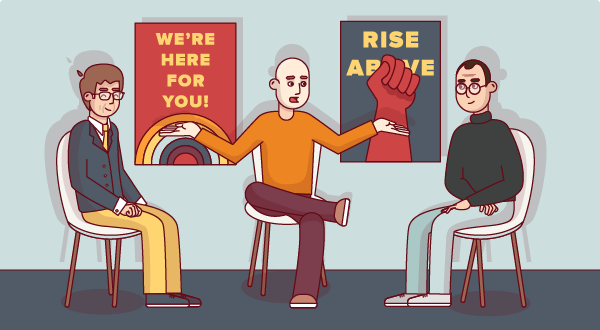Wil Schroter

Imagine sitting in a room where every person across from you is dealing with the same crazy startup shit that you are.
Everyone is worried about making not only payroll but their mortgage payment. Everyone is wondering how to deal with annoying investors. Everyone feels like a total fraud, not just you. And most importantly — everyone is willing to talk about it — honestly.
Welcome to Founder Therapy.
There's a growing trend among Founders to begin talking openly and honestly about the issues we face, beyond online rants and in private spaces where we can get back to being real people.
I've been hosting these sessions for over 20 years all around the country, mostly in my home, and have sat with over 1,000 Founders in that time. What I've learned is that bringing Founders together in a room can create some of the most honest and compelling discussions I've ever had.
It's truly a spiritual experience.
How does the evening go?
It's super chill.
At the beginning of the evening, one person lets folks know that each Founder will explain what they are working on, what their challenges are, and what they could use help with.
The "ask" of what folks can use help with is the most important, as it allows other Founders to tap their resources to help, which also brings the group together.
Founders love to help other Founders.
Is this some touchy-feely therapy session?
Not at all. It's just dinner or drinks. It could be coffee, but not surprisingly I've found Vodka Gimlets to be way more effective.
The evening isn't about "therapy" and I've never used that word. It's really just about allowing Founders to talk openly to their peers in a way that few of us ever do.
The more honest one Founder becomes in the discussion the more it permits the rest of the folks in the room to do the same.
How do we know who to invite?
There is a little calibration that helps here.
Often the groups are more effective if they can relate to each other's problems, and by way of that offer insight and support. It's sometimes difficult for a bootstrapped Founder trying to figure out how to hire one employee to relate to a venture-backed Founder with 1,000 employees.
Also, it's worth noting that in most cases at least half of the people in the room have never met each other, and in most cases, as the host, I've never met them either.
That sounds kind of awesome — how do I do this?
If you're feeling alone as a Founder — you're not alone.
Chances are every Founder in your city is feeling the same way, and would really appreciate the ability to get together to talk shop and if nothing else, blow off some steam.
The invite is simple — just invite a group of 6-12 Founders somewhere that everyone can have a single conversion. I do it in my living room, but you could just as soon do it anywhere you have some privacy (that's key).
The group can change every time if you'd like, and you'll probably find that Founders want to bring their friends to the next one.
All that you need is the first invite to get the ball rolling.
In Case You Missed It
The emotional cost of being a startup Founder (podcast) Wil and Ryan discuss how to start having a more open conversation about what it really costs to be a startup Founder.
5 Things Founders Don’t Talk About. As Founders, it’s hard to talk about personal feelings, especially when they relate to failing. But these conversations need to happen.
How do you deal with the emotional ups and downs of starting a business? Kris Kelso, Founder of the Kelso Group, breaks down the 3 ways he deals with the forces of startup loneliness.
Find this article helpful?
This is just a small sample! Register to unlock our in-depth courses, hundreds of video courses, and a library of playbooks and articles to grow your startup fast. Let us Let us show you!
Submission confirms agreement to our Terms of Service and Privacy Policy.
Already a member? Login
No comments yet.
Start a Membership to join the discussion.
Already a member? Login

